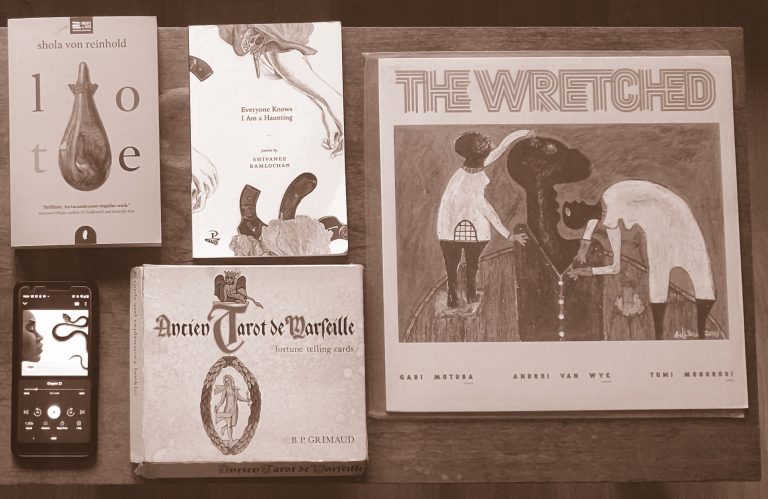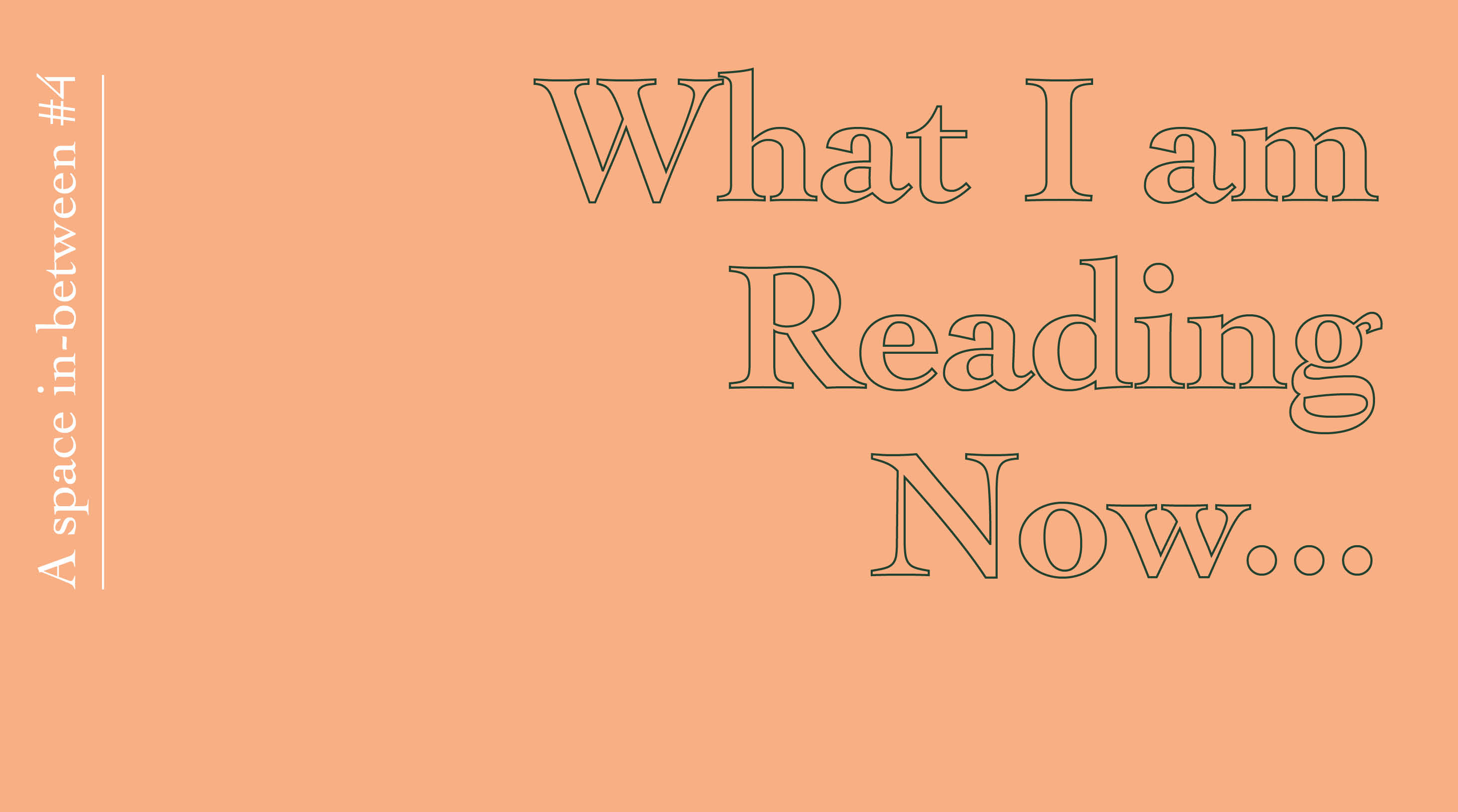What I am Reading Now…
Ashanti Harris
February 2022
When the dance studios finally re-opened in 2021 a wise and wonderful friend, who is also a dancer, introduced me to something he was researching called Aphantasia. In the way that I understood it, Aphantasia is a non-visual way of thinking. People with Aphantasia don’t think in images or “see” things in their imagination, instead they re-create the idea of an image in a new form. The form could be sound, it could be feeling, or it could be more abstract or conceptual than that. As an artist and a researcher working primarily with my body and movement to think, imagine and process, learning about Aphantasia made all of this make sense. I love to read theory, but the moment when the theory really clicks is when I feel it in my body. For the past wee while, I’ve been doing a lot of thinking about identity, heritage, history and different forms of cosmology, and this thinking has taken the form of dances, performances, re-enactments, rituals, songs, poems, compositions, sculptures, spells, seances and exorcisms.
What I’m feeling now… somatic explorations to the album The Wretched – a collaboration between musicians Gabisile Motuba, Tumi Mogorosi and Andrei van Wyk, exploring Frantz Fanon’s seminal text The Wretched of the Earth. It sounds like avant-garde Jazz and it feels like the elasticity of time, layering the thoughts heaved into the world by Fanon with the conditions that frame our world in the present day. It’s music that you really feel in your body, for better or for worse, so it makes sense to me to process it through my body in movement.
What I’m doing now… Tarot readings and astrology. In my experience, some people really “believe” astrology and others absolutely do not. For me, it’s a tool to process or uncover what I’m thinking or feeling. It’s not about getting answers, it’s about asking yourself questions and doing the work to understand.
What I’m listening to now… I am terrible at finishing books but that changed when I discovered audiobooks. I am addicted to audiobooks. I love to listen when I’m walking to work, while I cook, and I know I’m hooked when I have to keep listening while I’m in the shower. The audiobook that got me through 2021 was Freshwater by Akwaeke Emezi. I had been thinking a lot about identity and all the ghosts, ancestors and demons that make a person who they are, alongside every strife and struggle, alongside every dream, every experience and every moment of growth. Freshwater touches all of that and more. It’s a novel following the life of a child and the gods who live inside them. It’s about the slipperiness of self. It’s dark and it’s complicated and it’s beautiful. The audiobook is narrated by the author themselves, which always makes me feel like I’m hearing the story the way it was meant to be told.
My exception to this preference for audiobooks is poetry. As much as I love to hear the words directly from the author, with poetry I like to explore the feel of them in my mouth. I read them aloud over and over, until I start to know them like songs. For the past few years, I have been constantly returning to the collection of poems and prose by Martin Carter called University of Hunger. When I was a young adult, Martin Carter’s poetry was my way into my Guyanese heritage. I found the stories and proverbs I learnt from my parents, woven into verses of truths that would take me time to understand. I kept coming back to his poem, To A Dead Slave, which was written in 1951 in the run up to Guyanese Independence and incites the anger, strength and unity which fuelled a slave rebellion that took place over a hundred years earlier. It celebrates the identity of a nation whose story has come from a long history of resistance, revolution and dreaming.
Every time I re-read any poem in the collection Everyone Knows I Am a Haunting by Shivanee Ramlochan, the words tear softly through my body, leaving every part of me prickled with feeling. I can’t find any other way to describe it. In every reading I find a new meaning, and feel freshly held by the words. The author is from Trinidad, a country which is so culturally similar to Guyana, and these poems, often about ghosts, also feel like a déjà vu of my own hauntings.
And lastly, what I am about to read now… is the novel Lote by Shola von Reinhold. The story interrogates the removal and obscurement of Black figures from history through the story of a young woman who comes across an old photograph of a forgotten black Scottish modernist poet, and becomes fixated. In my own work I have developed relationships with historical figures whose existence has been so important to me. Lote feels reminiscent of this familiar place of love and speculation and I am really looking forward to getting into it.
Ashanti Harris is a multi-disciplinary artist and researcher based in Glasgow. Working with dance, performance, facilitation, film, installation and writing, Ashanti’s work disrupts historical narratives and reimagines them from a Caribbean diasporic perspective. As part of her creative practice, she is co-director of the dance company Project X – platforming dance of the African and Caribbean diaspora in Scotland; and works collaboratively as part of the collective Glasgow Open Dance School (G.O.D.S) – facilitating experimental movement workshops and research groups. She is also lecturer in Contemporary Performance at the Royal Conservatoire of Scotland and co-facilitates the British Art Network research group The Re-Action of Black Performance.
Listening
The Wretched, Gabisile Motuba, Tumi Mogorosi and Andrei van Wyk (SAVVY records, 2020)
Reading
Ancient Tarot de Marseille and Astrology forecasts from Chani Nicholas
Freshwater, Akwaeke Emezi (HighBridge, 2018)
University of Hunger: Collected Poems and Selected Prose, Martin Carter (Bloodaxe Books Ltd, 2006)
Everyone Knows I Am a Haunting, Shivanee Ramlochan (Peepal Tree Press Ltd, 2017)
Lote, Shola von Reinhold (Jacaranda Books, 2020)

Please note the views published in What I am Reading Now… are personal reflections of the contributors.
These may not necessarily represent the views of the University of Dundee.
———
Previous Issue: Ranjana Thapalyal, January 2022
Next Issue: Rabindranath X Bhose, March 2022
